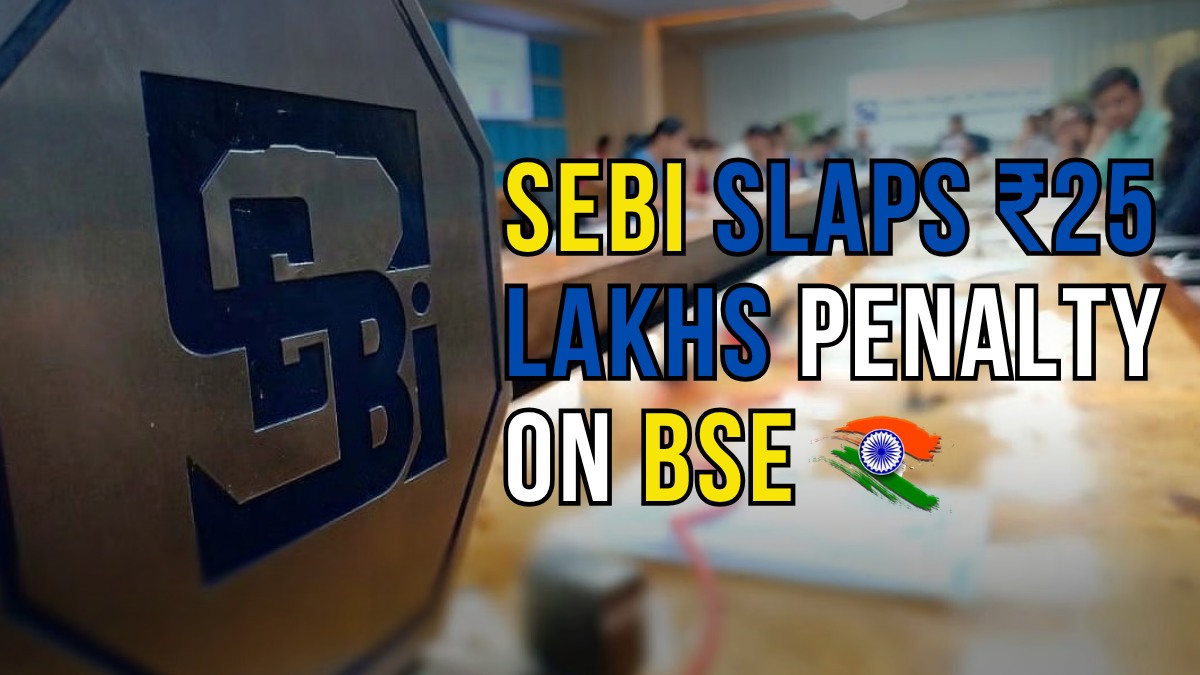Unequal Access to Data Sparks Controversy
The Securities and Exchange Board of India (SEBI) recently fined the Bombay Stock Exchange (BSE) ₹25 lakhs, citing critical lapses in governance and data dissemination processes. These violations, detected during an inspection stretching from February 2021 to September 2022, have raised significant concerns over the functioning of one of India’s premier stock exchanges.

This article dives into the reasons behind the penalty, explores SEBI’s findings, and highlights the implications for stakeholders.
What Prompted SEBI to Penalize BSE?
The regulator pinpointed two primary issues:
- Unequal Access to Corporate Disclosures
SEBI found that BSE’s system allowed early access of corporate announcements to its paid clients and internal Listing Compliance Monitoring (LCM) team, ahead of their official website publication. This resulted in what was perceived as an unfair advantage and was a direct breach of the “equal access” principle.
- Weak Oversight on Brokers’ Trade Practices
The exchange failed to monitor client code modifications effectively. SEBI flagged repeated instances of code changes among brokers, which were unexplained and lacked due diligence, opening doors for potential misuse.
Key Findings from SEBI’s Report
Here’s a closer look at SEBI’s observations and conclusions outlined in its 45-page report:
- Data Dissemination Failures
BSE’s manual data pull model and absence of a Real Simple Syndication (RSS) feed created delays, preventing equal access to market-sensitive information. Instances showed:
-
- Paid clients accessed disclosures before general stakeholders in 6% of cases.
- The LCM team received early visibility in 98% of examined announcements.
- No Action Against Errant Brokers
Evidence revealed that BSE lacked disciplinary measures for brokers with frequent and unjustifiable trade modifications, raising concerns of operational lapses.
- Slow Corrective Measures
Although BSE later implemented a “time gap” system to ensure delays for paid subscribers, this was a reactive step post-SEBI inspection, not a proactive framework to ensure compliance.
These gaps breach Regulation 39(3) of the Securities Contracts (Regulation) SECC Regulations, 2018, which mandates stock exchanges to ensure robust, equal, and transparent data systems.
Breakup of the ₹25 Lakhs Fine
The penalty was allocated as follows:
- ₹15 Lakhs under the Securities Contracts (Regulation) Act for failing on equal access obligations.
- ₹10 Lakhs under the SEBI Act for weak oversight on client code modifications and broker monitoring.
Implications for BSE and the Market
- Reputational Damage
For a stock exchange of BSE’s stature, such violations threaten its reputation as a credible and neutral operator within India’s financial markets.
- Potential for Investor Distrust
These findings may stir concerns among general investors regarding the exchange’s ability to act impartially, especially since ensuring market transparency is its core mandate.
- Operational Overhaul Needed
SEBI’s decision emphasizes the need for stronger internal controls, automated systems (such as RSS feeds), and stricter measures to supervise broker activities transparently.
BSE’s Stance and Corrective Actions
BSE defended its actions, claiming the violations were purely technical and did not lead to any financial gain or loss for stakeholders. Despite these assertions, the exchange acknowledged the issues and has introduced several measures to address SEBI’s findings:
- Introduction of Controlled Time Gaps: Ensuring that paid clients wait for data access after public dissemination.
- Enhanced Monitoring of Broker Practices: Implementing checks to mitigate misuse of error accounts.
- Website Prioritization Updates: Ensuring general investors benefit from timely access to disclosures.
The Larger Message for Indian Markets
SEBI’s penalty against BSE underscores a critical principle of modern financial regulation: trust and transparency are paramount. Stock exchanges bear immense responsibility as they are the first gatekeepers of market integrity.
By cracking down on lapses, the market regulator sends a clear signal to all players in India’s financial ecosystem to strengthen systems, ensure compliance, and prioritize fairness.
FAQs About SEBI’s Penalty on BSE
1. Why did SEBI impose a fine of ₹25 Lakhs on BSE?
A. SEBI imposed the fine due to BSE’s failure to ensure equal access to corporate disclosures and its lapses in monitoring improper broker trade practices.
2. What specific regulations were violated by BSE?
A. BSE violated Regulation 39(3) of the Securities Contracts (Regulation) SECC Regulations, 2018, which mandates stock exchanges to ensure fair access to information for all stakeholders.
3. How did data dissemination issues occur at BSE?
A. BSE’s manual systems allowed its paid clients and internal teams, such as the LCM, to access corporate disclosures earlier than public stakeholders, creating a fairness discrepancy.
4. What steps has BSE taken to address these violations?
A. BSE introduced time gaps for paid subscriber data access, prioritized website updates, and improved oversight mechanisms for broker trade monitoring as part of its corrective actions.
5. What does SEBI hope to achieve with this penalty?
A. Through this penalty, SEBI aims to reinforce the importance of market transparency and fairness, ensuring stock exchanges maintain ethical practices that safeguard investor trust.
For More Information Click HERE